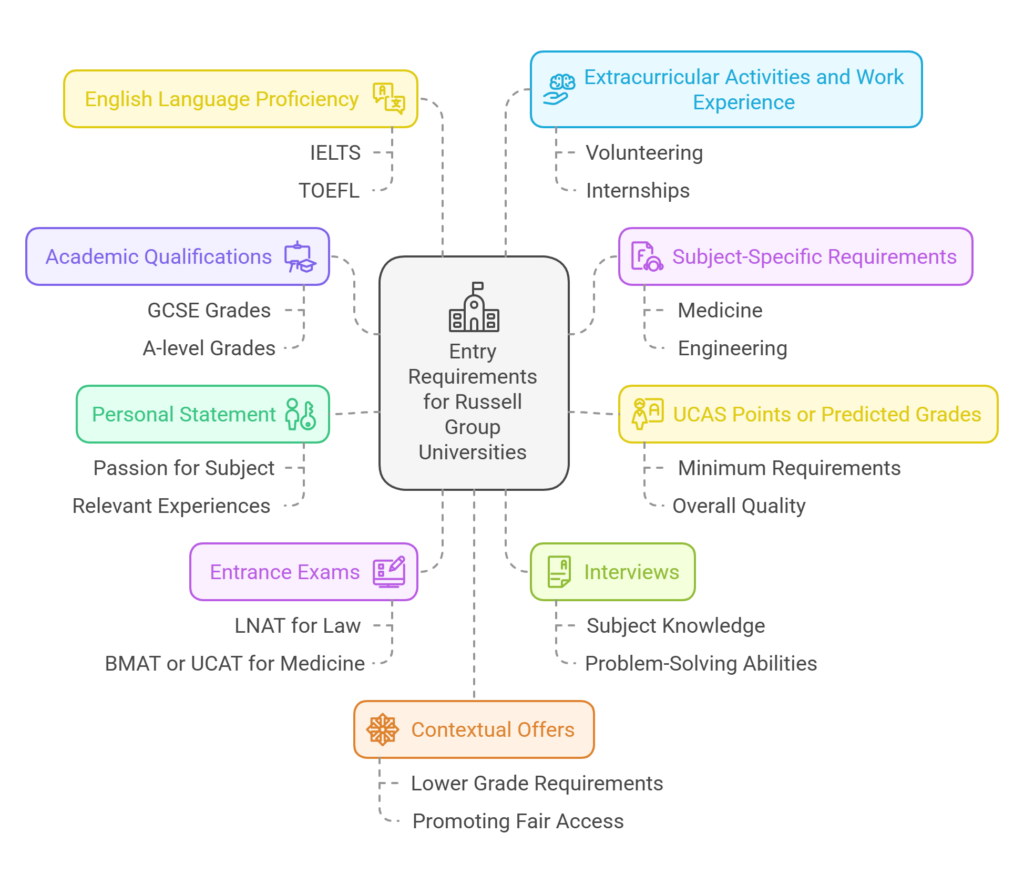Russell Group universities are some of the best in the United Kingdom. This group of 24 universities is known for excellent teaching, world-class research, and making a big impact on society. From the historic universities of Oxford and Cambridge to modern centres like Imperial College London and the University of Manchester, these institutions shape future leaders and innovators.
In this blog, we’ll cover everything about Russell Group universities. You’ll learn their history, the benefits of studying there, and what makes them special. Whether you’re a student, a parent, or just curious, this guide will help you understand why these universities are so highly regarded.
Which Universities Are Members of the Russell Group?
The Russell Group includes 24 of the UK’s leading universities. These institutions are known for their research excellence, high academic standards, and global reputation. They span across England, Scotland, Wales, and Northern Ireland.
Russell Group Universities UK
| University | Location | QS World Ranking 2024 | Student Population | Founded |
| University of Birmingham | Birmingham | 89 | 38,000+ | 1900 |
| University of Bristol | Bristol | 55 | 25,000+ | 1876 |
| University of cambridge | Cambridge | 2 | 24,000+ | 1209 |
| Cardiff University | Cardiff | 154 | 33,000+ | 1883 |
| Durham University | Durham | 78 | 20,000+ | 1832 |
| University of Edinburgh | Edinburgh | 22 | 45,000+ | 1583 |
| University of exeter | Exeter | 153 | 26,000+ | 1955 |
| University of glasgow | Glasgow | 76 | 29,000+ | 1451 |
| imperial college london | London | 6 | 19,000+ | 1907 |
| King's college london | London | 35 | 31,000+ | 1829 |
| University of leeds | Leeds | 86 | 38,000+ | 1904 |
| University of liverpool | Liverpool | 181 | 27,000+ | 1881 |
| London school of economics and political science | London | 56 | 11,000+ | 1895 |
| University of Manchester | Manchester | 32 | 40,000+ | 1824 |
| Newcastle University | Newcastle upon Tyne | 122 | 28,000+ | 1834 |
| University of Nottingham | Nottingham | 112 | 34,000+ | 1881 |
| University of Oxford | Oxford | 1 | 24,000+ | 1096 |
| Queen Mary university of London | London | 145 | 26,000+ | 1887 |
| Queen's university Belfast | Belfast | 202 | 25,000+ | 1845 |
| University of Sheffield | Sheffield | 96 | 29,000+ | 1905 |
| University of Southampton | Southampton | 78 | 25,000+ | 1862 |
| University College London | London | 9 | 41,000+ | 1826 |
| University of Warwick | Coventry | 67 | 28,000+ | 1965 |
| University of York | York | 162 | 20,000+ | 1963 |
Little bit about russell group History
The Russell Group formed in 1994 to represent 17 top research universities in the UK. The group took its name from the Russell Hotel in London, where they first met. The aim was to give these universities a united voice to secure funding and support for their research and teaching excellence.
Since then, the Russell Group has grown to 24 universities. These institutions are known for their high academic standards, innovative research, and impact on society. As a result, they drive progress, influence policies, and attract talent from across the globe. Today, the Russell Group is widely recognised as a mark of quality in UK education, with its members often ranked among the world’s best universities.
How Can I Prepare to Apply to a Russell Group University?

Preparing for a Russell Group university requires focused effort. Here’s how you can get started:
- Research Your Options
Explore the courses and universities that match your goals. Additionally, review entry requirements, course details, and campus life to make an informed decision. - Focus on Academic Excellence
Achieve strong grades in your GCSEs, A-levels, or equivalent qualifications. Pay extra attention to subjects relevant to your chosen course. - Develop a Strong Personal Statement
Write a personal statement that reflects your passion for the subject. Additionally, highlight your achievements, relevant experiences, and what makes you a strong candidate. - Gain Relevant Experience
Participate in extracurricular activities, internships, or volunteer work that align with your field. In doing so, you can set your application apart. - Prepare for Entrance Exams
If required, practise for tests like the UCAT, LNAT, or BMAT using past papers and prep resources. Start early to boost your confidence. - Seek References from Teachers
Request references from teachers who know your strengths and abilities. A strong recommendation can support your application significantly. - Stay Organised with Deadlines
Keep a calendar of UCAS deadlines and specific requirements for each course. Ensure your application is complete and submitted on time. - Attend Open Days or Virtual Tours
Visit campuses or join virtual events to learn about the facilities, teaching style, and student support services. - Strengthen Your Skills
Work on skills like critical thinking, time management, and independent study, which are highly valued by Russell Group universities. - Plan for Interviews
Practise answering potential interview questions to build confidence. Mock interviews with teachers or mentors can be helpful. - Research Financial Support
Look into scholarships, bursaries, and financial aid options available at Russell Group universities. Doing so can significantly ease your financial planning.
By following these steps, you’ll create a strong foundation for your application and increase your chances of being accepted to a prestigious Russell Group university.
Entry Requirements for Russell Group Universities
Russell Group universities are among the top institutions in the UK. Their entry requirements are high to match their academic standards. Each university and course has its own criteria, but there are common things to know.
To get a place, students usually need strong GCSE and A-level grades (or equivalent). Most courses prefer A* and A grades, especially in key subjects. Some degrees, like Medicine or Engineering, may also require specific subjects.
Good grades are not enough. Applicants need a strong personal statement. This should show passion for the subject, relevant experience, and achievements. Some courses also ask for entrance exams or interviews to assess applicants further.
Students whose first language is not English may need to pass tests like IELTS or TOEFL. Some universities also offer contextual offers. These lower the entry requirements for students from disadvantaged backgrounds to ensure fair opportunities.

What Are the Benefits of Studying at a Russell Group University?
Studying at a Russell Group university has many benefits. First, these universities are famous for their academic quality. Additionally, they have a strong global reputation, which adds value to any degree earned there.
Russell Group universities provide top-level teaching. In addition, students are taught by experts and have access to the best resources. As a result, this ensures a strong education.
Research is a key focus at Russell Group universities. As a result, students can work on projects that tackle real-world challenges. Consequently, this makes learning more meaningful and practical.
Graduates from these universities are highly valued. Employers respect the skills and knowledge students gain. Strong links with industries also help students find good jobs.
Facilities at Russell Group universities are excellent. For example, libraries, labs, and study spaces are equipped with modern technology. As a result, these resources greatly support student success.
Students join a diverse, global community. This helps them make connections and understand different cultures.
Many universities offer financial help through scholarships. As a result, it becomes easier for students from all backgrounds to study.
These universities also focus on personal growth. They offer sports, clubs, and volunteering opportunities. These activities help students build skills beyond academics.
Key Benefits
- World-class teaching
- Opportunities to join important research projects
- High graduate employability
- Access to excellent facilities
- Diverse and global student community
- Scholarships and financial support
- Opportunities for personal development
Russell Group universities give students the tools and opportunities to succeed in their education and future careers.
Do Employers Prefer Russell Group Graduates?

Employers often prefer graduates from Russell Group universities because of their strong reputation. Moreover, these universities provide a high standard of education, ensuring that students receive a comprehensive and rigorous academic experience. As a result, students develop critical thinking and problem-solving skills, qualities that employers highly value.
Russell Group universities are also leaders in research and innovation. This exposes students to new ideas and developments, helping them stay adaptable and forward-thinking. Many courses include internships and placements, giving students real-world experience. This makes them more prepared for the job market.
The global reputation of Russell Group universities gives their graduates an advantage. Employers recognise the quality of their education and skills. While not all employers prefer Russell Group graduates, their strong training and readiness for work often set them apart.
What Is the Hardest Russell Group University to Get Into?
The University of Oxford and the University of Cambridge are, undoubtedly, the hardest Russell Group universities to enter. Known for their exceptional academic standards, they attract top students from around the world. As a result, this makes admission highly competitive.
Both universities need excellent A-level results, often A* and A grades. Applicants must also pass entrance exams like the BMAT or LNAT. Interviews further test critical thinking and subject knowledge, making the process even tougher.
Other universities, such as Imperial College London and LSE, are also very selective. Courses like Medicine and Law are especially competitive. While difficulty depends on the course, Oxford and Cambridge are consistently the hardest to get into.
Conclusion
The Russell Group represents some of the UK’s most prestigious universities, known for their academic excellence, cutting-edge research, and global reputation. These institutions provide students with outstanding opportunities for growth, career success, and access to world-class resources. Whether you’re aiming to join a Russell Group university or simply want to be inspired by their standards, their approach to education sets a high bar.
Also, If you’re seeking guidance on how to excel academically, Edumentors can help. Our professional tutors, many from the UK’s top universities, provide personalised support tailored to your needs. With their expertise, you can achieve your academic goals and develop the skills to succeed, whether you’re preparing for university or aiming to excel in your current studies.








